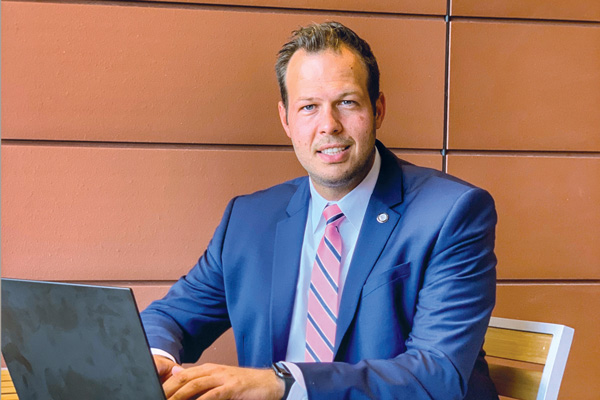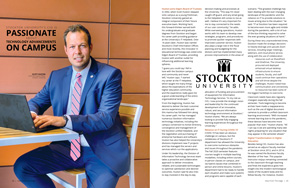Huston Joins Edge’s Board of Trustees
In 2002, when Scott Huston stepped onto campus as a young freshman, Stockton University gained an integral component of their future executive team. Working hard, this forward-thinker earned both his undergraduate and graduate degrees from Stockton and began his career path providing guidance at the University’s IT Helpdesk. Over 16 years later, Huston was named Stockton’s Chief Information Officer, and most recently, this innovator in educational technology was voted onto Edge’s Board of Trustees, providing Huston with another outlet for influencing additional learning spheres.
 “I guess you could say I fell in love with the Stockton campus and community and never left,” Huston says. “I started my career at the IT Helpdesk, which taught me many things about the expectations of the higher education community, and the experience really gave me a good understanding of the entire organizational landscape.”
“I guess you could say I fell in love with the Stockton campus and community and never left,” Huston says. “I started my career at the IT Helpdesk, which taught me many things about the expectations of the higher education community, and the experience really gave me a good understanding of the entire organizational landscape.”
From the beginning, Huston has desired to deliver the best customer service experience possible and this mantra has followed him along his career path. He has managed numerous Stockton information technology initiatives, including the campus conversion to Active Directory, convergence and management of the Stockton unified Helpdesk, and the negotiation and purchasing of enterprise hardware and software. Huston has also helped the University’s divisions implement new IT projects and has managed the servers and services which run the applications.
Under his leadership, the Division of Information Technology Services team takes a proactive and collaborative approach to deliver innovative, reliable, and sustainable technologies to optimize satisfaction and desired outcomes. Huston said he also tries to stay involved in the day-to-day decision-making and processes at the University. “This way I’m never caught off-guard, and any email going to the Helpdesk still comes to me as well. I believe it’s very important for me to stay connected to the needs of our user community,” he adds. While overseeing operations, Huston works with his team to develop new strategies, programs, and procedures to promote quicker responses with improved customer service. Huston also plays a large role in the fiscal planning and budgeting for the division and has implemented many process improvements in the areas of allocation of funding and procurement of equipment for Information Technology Services. “In my role as CIO, I now provide the strategic vision and leadership for the continued development of an innovative, robust, and secure information technology environment at Stockton,” Huston shares. “We are always looking to provide fully engaging learning experiences throughout the University.”
“We need to sustain the higher education experience with information security strategies and high education affordability, because at the end of the day, the most important thing to remember is we are here for the students.”
– Scott Huston

Reliance on IT During COVID-19
COVID-19 has been an obvious challenge on campus, but the nimbleness of Stockton’s IT department has allowed the University to overcome numerous obstacles and issues throughout the pandemic. The Fall 2020 semester features courses taught in multiple teaching modalities, including online courses, in-person classes on campus, and via hybrid classes that combined in-person and online lessons. Huston’s department had to be ready to handle each situation and make sure systems and programs were capable of each scenario. “The greatest challenge has been dealing with the ever-changing landscape of the pandemic and the reliance on IT to provide solutions to issues arising due to the situation,” he said. “IT at Stockton has been required to become even more agile and nimble during the pandemic, with a lot of out-of-the-box thinking required to solve the ever-growing situations at hand.”
During these very unprecedented times, Stockton made the strategic decisions to heavily leverage and upscale Zoom services, including larger meetings, webinars, and cloud phone service, along with the use of collaboration resources such as SharePoint and OneDrive. The University procured and deployed enhanced virtual desktop infrastructures to ensure students, faculty, and staff could continue their operations and still thrive despite the challenges. Huston noted how communication and connectivity to resources has been some of the biggest hardships to overcome.
Classroom needs have also regularly changed, especially during the fall semester. Tools beginning to become archaic have made a reappearance, such as the use of digital document cameras to provide a unified classroom learning environment. “With increased remote learning due to the pandemic, these devices have become more popular than ever,” Huston shares. “All I can say is we are spending many late nights preparing for any situation that may appear in the semester ahead.”
Digital Transformation in Higher Education
Besides being CIO, Huston has also served as an adjunct faculty member at Stockton since 2012, and in 2014, he was named the Business Faculty Member of the Year. This popular instructor enjoys remaining connected to the classroom through teaching and finds the experience gives him insight into the modern technological needs of the student body and his fellow faculty. For instance, Huston believes higher education must innovate in order to provide world-class instructional technologies. He says digital transformation must take place by using technology to assist with student retention and completion, as well as to employ advanced data analytics to ensure colleges and universities are providing students with the best educational experience possible. “I think EDUCAUSE got it right; digital transformation is all about simplifying the end user experience and technologies to support their needs, while still providing an advanced and imaginative experience for users at all levels.” He continues, “We need to sustain the higher education experience with information security strategies and high education affordability, because at the end of the day, the most important thing to remember is we are here for the students.”
The use of emerging technologies and practices aid the process for ongoing digital transformation. Stockton uses Analytics for Inclusive Student Success to create a strategic plan for their campus. Huston says the school heavily utilizes reporting and analytics to recruit, support, and empower their increasingly diverse student body, while working closely to fill equity gaps often existing in higher education. “Every CIO’s agenda should look to improve the analysis of student data, student success planning, and advising systems and predicative analytics for student success,” he added. “But as pure strategic technologies, gaining redundancy and expanding possibilities through a blended data center should be on the mind of every CIO.” However, more importantly, Huston says the growing complexity of security threats keeps him up at night. “Information Security is something you always have to be concerned about.”
Innovative Technologies Benefit the University
Currently, colleges and universities are experiencing the importance of cloud services and software as service offerings. This change is causing a shift for many institutions. “The result is a swing from capital expense to operating expense, but with the appropriate planning the benefits can be huge,” Huston explains. “Educational technology will continue to advance and transform in the future, however, there will always be underlying needs for the University community.”
Outside of technological resources like the HyFlex Course Model needed to overcome COVID-19 obstacles, Huston believes those colleges and universities who begin to offer multiple learning modalities simultaneously will be very important for the future university student. Ongoing, Stockton plans to continue to investigate alternate modality technologies and services with the IT team, working for the creation and production of high quality pedagogical-focused learning materials across all disciplines. “I hope the industry as a whole continues to focus on these opportunities and future technologies can be leveraged to support the HyFlex learning model,” Huston explains. “Over the last few months, I’ve been amazed watching the unbelievable creative and innovative ways Stockton’s faculty have used technology to create some excellent methods for instruction. I hope to continue doing everything possible within my means to support this type of activity.”
Collegiate Esports is another area where Stockton University has been a leader. In 2019, the institution had 85 student competitors spread across seven different sports and had over 350 very active community members. The Esports teams received four first place finishes in various national tournaments, putting in over 15,000 hours of utilization in Stockton’s dedicated Esports labs.
As Edge enters the world of Esports, Stockton’s Esports teams have had hundreds of students attending their community gaming events on campus. “The program is thriving more than ever! We have open play nights throughout the week, which was popular with students, and we hosted multiple middle and high school teams on campus for Esports related events,” he says. “We are looking forward to Edge’s continued involvement with collegiate Esports in New Jersey and their continued support of the initiatives here at Stockton.”
Edge is very appreciative for Huston’s willingness to contribute his skills and expertise to the overall Edge community, as he joins the Board of Trustees.



